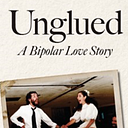What We Caregivers Talk About When We Talk About Self-Care
I do my best brooding in the shower, especially on a cold October day like today, gray as cinder, an all-day rain-snow-sleet sludge pelting the doomed snapdragons in my wife’s garden, and there’s Minnesota in 2020 for you in one snapshot.
I sound like a sourpuss, because who isn’t one these days. But I’ve got hope. My wife’s late-onset bipolar disorder has stabilized, thanks to good fortune, great docs, and the right meds. A few summers ago, though, I nearly lost my own mind during her initial rageful manic episode, a couple years before I nearly lost her altogether from her suicide attempt during her second severe depression.
I brooded about that today, about the pain of a loved one’s invisible illness. About an AARP report this month suggesting two thirds of the adult population in the United States is suffering social isolation and anxiety during the pandemic. About how millions of people are trapped in their own homes and in their own minds, closed off to the help they need. How most people, especially these stoic Midwesterners I shovel snow alongside, would rather wallow in silence over a hot bowl of mush than tell anyone what a desperate hole they’re sinking in.
Well, when the stress of caregiving for a woman with eyes popping out of her head got to me, I, for one, fessed up. I needed help and found it.
I attended a support group. I went to a therapist. I exercised. I escaped. I saw my primary doc for Ativan to help unkink the knots in my gastro system.
And, behind my wife’s back, I knocked on my neighbors’ back door and drank their coffee and let them know what was going on at my house. And then I broke down and wept.
That might have been the most courageous and important thing I’ve done since my wife’s mental illness surfaced five years ago. For one thing, I learned that my neighbors’ son, who I’d known for twenty years, had been diagnosed with a mental illness as well.
More importantly, I learned my neighbors judged neither my wife for her illness nor me for my despair.
I learned that my desperate need for self-care mattered more than my manic wife’s desperate demand I keep our “communication problems” to myself.
I learned I could describe her illness compassionately and without judgment, respectfully and truthfully, from a tender spot in my heart I had no idea existed.
I learned I could tell other neighbors and friends and relatives and write a whole book about the shitshow we caregivers go through and do so with profound love for my wife and empathy for the challenges she and others live with. I learned I could come out the other side a kinder and more gracious human being. I learned that in an angry and anonymous digital world, cherished human connections are still possible.
I learned that if we are to overcome the stigma and discrimination associated with mental illness, we must begin talking about it now, starting in our own backyards.
I get it. Not everyone’s got neighbors like mine. But, I learned, the really crazy thing to do is to pretend our lives are anything like sane right now.
